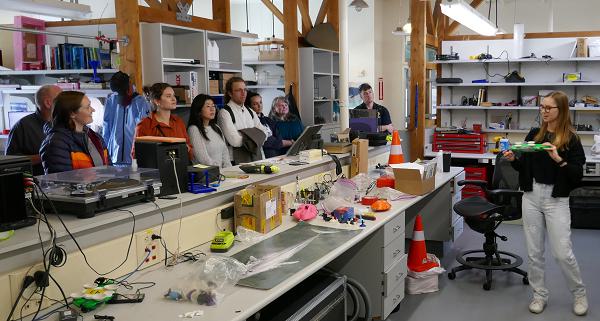
Monterey Bay, California. (September 19, 2024): There are hundreds of organizations battling the effects of climate change, but one entity is often overlooked… the U.S. Navy. In this photo by Dan Linehan, newly minted Climate Security Fellows join Naval Postgraduate School (NPS) leaders at Standford University’s Hopkins Marine Station. At right, Ashley Blawas, a postdoctoral scholar in the Stanford Doerr School of Sustainability's Oceans Department, shows a tracking tag she developed for measuring the heart rate of whales. The NPS and the Stanford Doerr School of Sustainability joined forces recently to form an Educational Partnership Agreement to address the impacts of climate change.
Rising sea levels and global temperatures have resulted in more severe storms, wildfires, droughts, floods, and extreme weather that threatens national security. That is why the Navy has established a new Climate Security Fellowship program with Stanford beginning in 2022. Under the current effort, twelve graduate and postdoctoral students from NPS and Stanford were charged with developing new ideas and innovative solutions to operational threats facing the Navy and Marine Corps.
These Climate Security Fellows came from a wide range of educational and business experiences including recent Naval Academy graduates. The group studied defense infrastructure, meteorology, oceanography, and national security affairs. Later in the year, teams of three investigated current climate change issues and presented their findings in detailed project reports. Next year, the Navy plans to expand the program to twenty Fellows and will include new institutional partners as well.
Often overlooked, the Navy is contributing in a major way in the fight against the effects of climate change.


